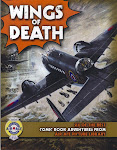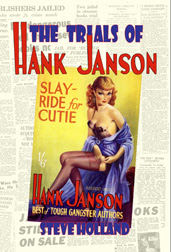 "Mr. Alphonse Courlander is an author whose work has reached a high level of excellence. His romances teem with careful thought, and it is easy to read between their lines the fact that the author is master of his subject.
"Mr. Alphonse Courlander is an author whose work has reached a high level of excellence. His romances teem with careful thought, and it is easy to read between their lines the fact that the author is master of his subject."A comparatively young man, Mr. Alphonse Courlander has made phenomenal strides up the literary ladder. Perhaps it was his writing of poetry that first set him on his climb for the heights of authorship. He published a little volume called "Perseus and Andromeda" and then throwing aside all ideas of engineering--his first love--he plunged deeply into journalism, and at the age of twenty-one we find him on a daily paper."
Thus the editor of the Fiction Lover's Library introduced Eve's Apple to his readers. The reviewer at The New Age (13 June 1908) agreed that the author "writes, perhaps, rather better than the average of his class, and has a good notion of telling a story." However, this tale of a man of means and leisure whose life is blighted when he falls for a Parisian adventuress -- leading to disgrace and imprisonment -- also made the reviewer ask: "Why, then, should he deal in types and situations so wildly remote from the world of actuality?" A reviewer for The British Journal of Nursing (9 February 1907) had found his previous novel, The Sacrifice, rather melancholy and wishing that Courlander "would write of men and women with whom we could be more in sympathy."
Alphonse Courlander was of Russian extraction but born in London on 11 April 1881, the son of Louis Courlander (1849-1931) and his wife Gertrude (nee Hart, 1851-1913) who had married in Kensington in 1874. Louis was born in Libau (now Liepaja, Latvia) and made his living as a jeweller and optician.
Alphonse was the fourth of six children and lived for some time in the land of the Great White Czar -- "the land of music and the new literature." He was to become a correspondent for the Daily Express and covered "the whole gamut of the special correspondent's experience," ranging from covering the Socialist Congress at Copenhagen to war correspondence during the Balkan Wars. Courlander was the first war correspondent to get into Scutari after the Turks surrendered the city to the Montenegrins in April 1913.
Courlander would later say, "The art of writing in the daily newspapers is probably the most difficult of all forms of all forms of fiction ... you must never deliberately write down to your public." This attitude made him a popular contributor to many magazines, including The Strand, The London Magazine, Everybody's Magazine, Munsey's, Railway Magazine, The Captain, The Craftsman and elsewhere. He made journalists the heroes of his novel Mightier Than The Sword.
He was a friend of E. Nesbit. Correspondence in the Edith Nesbit Collection, McFarlin Library, Tulsa, includes a postcard from Courlander (in 1912) signed by his family and a request (undated) for an interview about her latest story. At the time of the latter, Courlander and his family -- he was married to Elsa Mary Pauline Hahn (1873-1952) in 1906 and had one child, a daughter named Rosemary Elsa Courlander (1909-1964) -- were living at 47 Queensborough Terrace, Portchester Gate, London W.
In 1914, Courlander was the Paris correspondent for the Daily Express when war broke out in Europe and this led to his tragic end, as related in My Seven Selves by Hamilton Fyfe (available here):
"I sent Bedelia home to England after a day or two and joined Alphonse Courlander in his apartment at the back of the Rue de Rivoli. His family were away. He was glad to have company. A third journalist, Rosetti, a Roumanian, also stayed there, and as long as we were together Alphonse was cheerful and confident. He talked about going to the front if his paper would send him and if he could ride "a little low horse." A delightful fellow he was, amusing, quick-witted, but not well-equipped to withstand the panic which seized the city as the Germans came nearer every day. I was driving back from Rouen one day just after it started and met on the road hundreds of vehicles of all descriptions making for the coast, piled with luggage and furniture and bedding and bird-cages, the owners' white faces peering out anxiously at the imprudent fellow who was going towards the danger. The alarm was intensified by the folly of the authorities. They had issued so many lying statements that no one believed anything — except that the danger was a great deal nearer than official announcements admitted. This untrustworthy character of the communiqué's got me into an adventure that might have ended in catastrophe. But let me finish the melancholy tale of Alphonse Courlander first.
"He was left alone in his flat. Rosetti had gone off somewhere. I was spending my time between the front and the coast, whither I had to take my despatches to be put on board steamers for England. Alphonse caught the prevailing epidemic of fright. One morning he made up his mind to leave for London. Then, as he sat in the train, the shame of abandoning his post came vividly before him and he jumped out. But the next morning he went to the station again and this time he stayed in the train. In London he was badly received. He killed himself. I am certain that if Rosetti and I had been with him he would have laughed at the panic and might be alive to-day. It was because nothing of the sort had ever before come into his safe, sheltered life that he imagined the horrors of a siege and bombardment to be much worse than they are."
Courlander died on 23 October 1914, aged 33.Novels
The Taskmaster. London, Duckworth & Co., 1904.
Seth of the Cross. London, Eveleigh Nash, 1905.
The Sacrifice. London, T. Fisher Unwin, 1907.
Eve's Apple. London, T. Fisher Unwin, 1908.
Henry in Search of a Wife. A fantasy of sentiment. London, T. Fisher Unwin, 1909.
Uncle Polperro. London, T. Fisher Unwin, 1910.
Mightier Than the Sword. London, T. Fisher Unwin, 1912.
Verse
Perseus & Andromeda. London, At the Unicorn, 1903.


















































Does anyone know whether copyright still attaches to any of Alphonse Courlander's works? In particular, to his poem 'the Phantom train'? If anyone's permission is needed to use this in my book, who do I ask? All answers gratefully received, Nicolas Wheatley, 25 August 2019. Nicwheatley53@gmail.com
ReplyDeleteHi Nic, All of Courlander's works are public domain, as copyright in the UK extends only 75 years after death -- in Courlander's case 1914+75=1989.
ReplyDelete